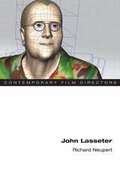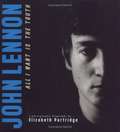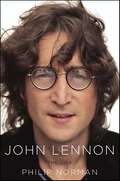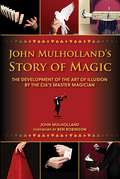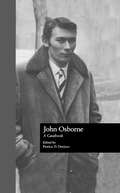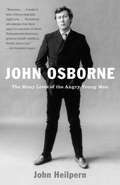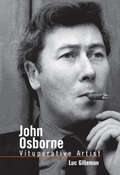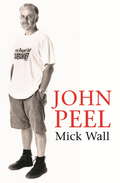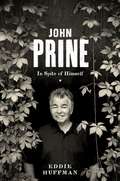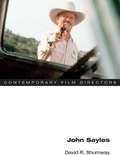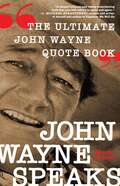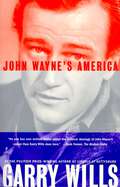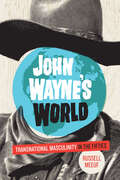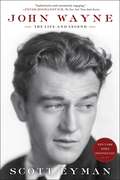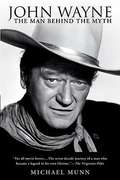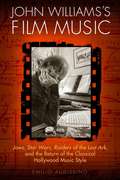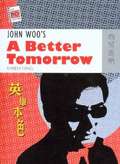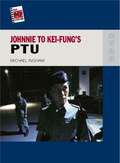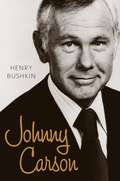- Table View
- List View
John Lasseter (Contemporary Film Directors)
by Richard NeupertCelebrated as Pixar's "Chief Creative Officer," John Lasseter is a revolutionary figure in animation history and one of today's most important filmmakers. Lasseter films from Luxo Jr. to Toy Story and Cars 2 highlighted his gift for creating emotionally engaging characters. At the same time, they helped launch computer animation as a viable commercial medium and serve as blueprints for the genre's still-expanding commercial and artistic development. Richard Neupert explores Lasseter's signature aesthetic and storytelling strategies and details how he became the architect of Pixar's studio style. Neupert contends that Lasseter's accomplishments emerged from a unique blend of technical skill and artistic vision, as well as a passion for working with collaborators. In addition, Neupert traces the director's career arc from the time Lasseter joined Pixar in 1984. As Neupert shows, Lasseter's ability to keep a foot in both animation and CGI allowed him to thrive in an unconventional corporate culture that valued creative interaction between colleagues. The ideas that emerged built an animation studio that updated and refined classical Hollywood storytelling practices--and changed commercial animation forever.
John Lennon: A Biography
by Elizabeth PartridgeAward-winning biographer Elizabeth Partridge dives into Lennon's life from the night he was born in 1940 during a World War II air raid on Liverpool, deftly taking us through his turbulent childhood and his rebellious rock 'n' roll teens to his celebrated life writing, recording, and performing music with the Beatles. She sheds light on the years after the Beatles, with Yoko Ono, as he struggled to make sense of his own artistic life - one that had turned from youthful angst to suffocating fame in almost a split second. Partridge chronicles the emotional highs and paralyzing lows that Lennon transformed into brilliant, evocative songs. John Lennon: All I Want Is the Truth is the unforgettable story of one of rock's biggest legends.
John Lennon: The Life
by Philip NormanFor more than a quarter century, biographer Philip Norman's internationally bestselling Shout! has been unchallenged as the definitive biography of the Beatles. Now, at last, Norman turns his formidable talent to the Beatle for whom being a Beatle was never enough. Drawing on previously untapped sources, and with unprecedented access to all the major characters, Norman presents the comprehensive and most revealing portrait of John Lennon ever published.This masterly biography takes a fresh and penetrating look at every aspect of Lennon's much-chronicled life, including the songs that have turned him, posthumously, into a near-secular saint. In three years of research, Norman has turned up an extraordinary amount of new information about even the best-known episodes of Lennon folklore—his upbringing by his strict Aunt Mimi; his allegedly wasted school and student days; the evolution of his peerless creative partnership with Paul McCartney; his Beatle-busting love affair with a Japanese performance artist; his forays into painting and literature; his experiments with Transcendental Meditation, primal scream therapy, and drugs. The book's numerous key informants and interviewees include Sir Paul McCartney, Sir George Martin, Sean Lennon—whose moving reminiscence reveals his father as never seen before—and Yoko Ono, who speaks with sometimes shocking candor about the inner workings of her marriage to John.“[A] haunting, mammoth, terrific piece of work.” -New York Times Honest and unflinching, as John himself would wish, Norman gives us the whole man in all his endless contradictions—tough and cynical, hilariously funny but also naive, vulnerable and insecure—and reveals how the mother who gave him away as a toddler haunted his mind and his music for the rest of his days.
John Lennon: Young Rock Star (Easy Biographies)
by Laurence SantreyA brief biography of the English rock musician with emphasis on his early years and the formation of the famous Beatles.
John Mulholland's Story of Magic: The Development of the Art of Illusion by the CIA's Master Magician
by John MulhollandMagic has entranced public forums for hundreds of years, predating many other forms of entertainment that we enjoy today. This ancient art, with its captivating illusions and seemingly impossible sleight of hand, is still as relevant today as ever. Originally published in 1935, master magician John Mulholland’s Story of Magic is a delightful tour through the progression of magic, from its origin to the book’s contemporary period. It offers insights and reflections on famous routines and tricks, black-and-white photographs and illustrations to give readers visual reference, as well as informative facts that weave together a timeline of events for those interested in the history of magic. With a brand-new foreword written by renowned master magician and historian Ben Robinson, this timeless classic will enchant readers and educate them on the art of magic.
John Osborne: A Casebook (Casebooks on Modern Dramatists #16)
by Patricia D. DenisonFor British playwright, John Osborne, there are no brave causes; only people who muddle through life, who hurt, and are often hurt in return. This study deals with Osborne's complete oeuvre and critically examines its form and technique; the function of the gaze; its construction of gender; and the relationship between Osborne's life and work. Gilleman has also traced the evolution of Osborne's reception by turning to critical reviews at the beginning of each chapter.
John Osborne: The Many Lives of the Angry Young Man
by John HeilpernJohn Osborne, the original Angry Young Man, shocked and transformed British theater in the 1950s with his play Look Back in Anger. This startling biography-the first to draw on the secret notebooks in which he recorded his anguish and depression-reveals the notorious rebel in all his heartrending complexity. Through a working-class childhood and five marriages, Osborne led a tumultuous life. An impossible father, he threw his teenage daughter out of the house and never spoke to her again. His last written words were "I have sinned." Theater critic John Heilpern's detailed portrait, including interviews with Osborne's daughter, scores of friends and enemies, and his alleged male lover, shows us a contradictory genius--an ogre with charm, a radical who hated change, and above all, a defiant individualist.
John Osborne: Vituperative Artist (Studies in Modern Drama)
by Luc GillemanFor British playwright, John Osborne, there are no brave causes; only people who muddle through life, who hurt, and are often hurt in return. This study deals with Osborne's complete oeuvre and critically examines its form and technique; the function of the gaze; its construction of gender; and the relationship between Osborne's life and work. Gilleman has also traced the evolution of Osborne's reception by turning to critical reviews at the beginning of each chapter.
John Paizs's Crime Wave
by Jonathan BallJohn Paizs's 'Crime Wave' examines the Winnipeg filmmaker's 1985 cult film as an important example of early postmodern cinema and as a significant precursor to subsequent postmodern blockbusters, including the much later Hollywood film Adaptation. Crime Wave's comic plot is simple: aspiring screenwriter Steven Penny, played by Paizs, finds himself able to write only the beginnings and endings of his scripts, but never (as he puts it) "the stuff in-between." Penny is the classic writer suffering from writer's block, but the viewer sees him as the (anti)hero in a film told through stylistic parody of 1940s and 50s B-movies, TV sitcoms, and educational films.In John Paizs's 'Crime Wave,' writer and filmmaker Jonathan Ball offers the first book-length study of this curious Canadian film, which self-consciously establishes itself simultaneously as following, but standing apart from, American cinematic and television conventions. Paizs's own story mirrors that of Steven Penny: both find themselves at once drawn to American culture and wanting to subvert its dominance. Exploring Paizs's postmodern aesthetic and his use of pastiche as a cinematic technique, Ball establishes Crime Wave as an overlooked but important cult classic.
John Peel
by Mick WallA tribute biography of the hugely popular DJ and broadcaster John PeelJohn Peel was born in Cheshire in 1939 and, after National Service, he eventually went into broadcasting while travelling in America, where his Liverpool accent convinced them he must know the Beatles, and he was even present when Lee Harvey Oswald was shot. In 1967 he returned to the UK and joined Radio One at its start. His late-night radio shows were cult listening for music fans of all ages, and many bands admit that without his support, they would never have made it.While Radio One changed, he remained a constant factor in its schedules, and in 1998 he was awarded the OBE for his services to broadcasting. It was in that year that he also began his multi-award-winning show Home Truths on Radio Four. Mick Wall tells the story of arguably the most influential man in the history of British rock music, speaking to those who knew him well to build up a complete portrait of this hugely popular figure.
John Peel
by Mick Wall'Excellent ... paints an affectionate portrait of this unpretentious, humorous presenter who seems to have been loved by everyone who met him' SUNDAY TIMES'A leisurely stroll through the life of an "irreplaceable man" - [a] thoughtful, well-paced portrait' OBSERVERA tribute biography of the hugely popular DJ and broadcaster John PeelJohn Peel was born in Cheshire in 1939 and, after National Service, he eventually went into broadcasting while travelling in America, where his Liverpool accent convinced them he must know the Beatles, and he was even present when Lee Harvey Oswald was shot. In 1967 he returned to the UK and joined Radio One at its start. His late-night radio shows were cult listening for music fans of all ages, and many bands admit that without his support, they would never have made it.While Radio One changed, he remained a constant factor in its schedules, and in 1998 he was awarded the OBE for his services to broadcasting. It was in that year that he also began his multi-award-winning show Home Truths on Radio Four. Mick Wall tells the story of arguably the most influential man in the history of British rock music, speaking to those who knew him well to build up a complete portrait of this hugely popular figure.
John Prine: In Spite of Himself
by Eddie HuffmanWith a range that spans the lyrical, heartfelt songs "Angel from Montgomery," "Sam Stone," and "Paradise" to the classic country music parody "You Never Even Called Me by My Name," John Prine is a songwriter's songwriter. Across five decades, Prine has created critically acclaimed albums--John Prine (one of Rolling Stone's 500 Greatest Albums of All Time), Bruised Orange, and The Missing Years--and earned many honors, including two Grammy Awards, a Lifetime Achievement Award for Songwriting from the Americana Music Association, and induction into the Nashville Songwriters Hall of Fame. His songs have been covered by scores of artists, from Johnny Cash and Miranda Lambert to Bette Midler and 10,000 Maniacs, and have influenced everyone from Roger McGuinn to Kacey Musgraves. Hailed in his early years as the "new Dylan," Prine still counts Bob Dylan among his most enthusiastic fans. In John Prine, Eddie Huffman traces the long arc of Prine's musical career, beginning with his early, seemingly effortless successes, which led paradoxically not to stardom but to a rich and varied career writing songs that other people have made famous. He recounts the stories, many of them humorous, behind Prine's best-known songs and discusses all of Prine's albums as he explores the brilliant records and the ill-advised side trips, the underappreciated gems and the hard-earned comebacks that led Prine to found his own successful record label, Oh Boy Records. This thorough, entertaining treatment gives John Prine his due as one of the most influential songwriters of his generation.
John Sayles (Contemporary Film Directors)
by David R. ShumwayJohn Sayles is the very paradigm of the contemporary independent filmmaker. By raising much of the funding for his films himself, Sayles functions more independently than most directors, and he has used his freedom to write and produce films with a distinctive personal style and often clearly expressed political positions. From The Return of the Secaucus Seven to Sunshine State, his films have consistently expressed progressive political positions on issues including race, gender, sexuality, class, and disability. In this study, David R. Shumway examines the defining characteristic of Sayles's cinema: its realism. Positing the filmmaker as a critical realist, Shumway explores Sayles's attention to narrative in critically acclaimed and popular films such as Matewan, Eight Men Out, Passion Fish, and Lone Star. The study also details the conditions under which Sayles's films have been produced, distributed, and exhibited, affecting the way in which these films have been understood and appreciated. In the process, Shumway presents Sayles as a teacher who tells historically accurate stories that invite audiences to consider the human world they all inhabit.
John Walker's Passage
by Darrell VargaJohn Walker is one of Canada's most prolific and important documentary filmmakers and is known for his many thoughtful, personally inflected films. His masterwork, Passage, centres on Sir John Franklin's failed expedition to find the final link of the Northwest Passage connecting the Atlantic and Pacific oceans through the Canadian Arctic. It also gives us the story of John Rae, the Scottish explorer who discovered the fate of Franklin and the final link in the passage, but was left to the margins of history. Walker's film brings to this story a layering of dramatic action and behind-the-scenes documentary footage that build tension between the story of the past and interpretations of the present.Darrell Varga provides a close analysis of Passage, situating it within Walker's rich body of work and the Canadian documentary tradition. Varga illuminates how the film can be viewed through the lens of Harold Innis's theories of communication and culture, opening up the work of this great Canadian political economist to film studies.
John Wayne Speaks: The Ultimate John Wayne Quote Book
by Mark OrwollWith more than 1,100 impeccably sourced quotes from throughout John Wayne's 172-film career, John Wayne Speaks: The Ultimate John Wayne Quote Book provides what has often been missing from other Duke Wayne reference books: accuracy, context, and comprehensiveness.These quotations offer a deep dive into Wayne’s films and acting persona—the iconic American man of action whose sense of values and decency are a veneer covering a boiling pot of determination, courage, outrage, and even violence. The quotes in John Wayne Speaks are at once inspirational, humorous, touching, and revealing.Author and veteran journalist Mark Orwoll has created an overlay of categories into which each quote fits, making the manuscript easy for readers to find the type of quote—or even the exact quote, footnoted to identify its film—they may be searching for. But John Wayne Speaks is more than just a collection of the actor's movie lines. Orwoll has researched and written an in-depth introduction to Wayne's film career to put the quotes in a broader context. Movie-lovers will also appreciate the author's opinionated capsule reviews and production notes from Wayne's complete filmography.John Wayne Speaks is the quote book that every fan of the Duke needs and a delightful addition to any cinephile’s library.
John Wayne's America
by Garry WillsThe Pulitzer Prize-winning author of Lincoln at Gettysburg brings his eloquence, wit, and on-target perceptions of American life and politics to this fascinating, well-drawn protrait of a twentieth-century hero. In this work of great originality-the biography of an idea-Garry Wills shows how John Wayne came to embody Amercian values and influenced our cultoure to a degree unmatched by any other public figure of his time. In Wills's hands, Waynes story is tranformed into a compelling narrative about the intersection of popular entertainment and political realities in mid-twentieth-century America.
John Wayne's World: Transnational Masculinity in the Fifties
by Russell MeeufIn a film career that spanned five decades, John Wayne became a U. S. icon of heroic individualism and rugged masculinity. His widespread popularity, however, was not limited to the United States: he was beloved among moviegoers in Asia, Africa, Latin America, and Europe. In John Wayne’s World, Russell Meeuf considers the actor’s global popularity and makes the case that Wayne’s depictions of masculinity in his most popular films of the 1950s reflected the turbulent social disruptions of global capitalism and modernization taking place in that decade. John Wayne’s World places Wayne at the center of gender- and nation-based ideologies, opening a dialogue between film history, gender studies, political and economic history, and popular culture. Moving chronologically, Meeuf provides new readings of Fort Apache, Red River, Hondo, The Searchers, Rio Bravo, and The Alamo and connects Wayne’s characters with a modern, transnational masculinity being reimagined after World War II. Considering Wayne’s international productions, such as Legend of the Lost and The Barbarian and the Geisha, Meeuf shows how they resonated with U. S. ideological positions about Africa and Asia. Meeuf concludes that, in his later films, Wayne’s star text shifted to one of grandfatherly nostalgia for the past, as his earlier brand of heroic masculinity became incompatible with the changing world of the 1960s and 1970s. The first academic book-length study of John Wayne in more than twenty years, John Wayne’s World reveals a frequently overlooked history behind one of Hollywood’s most iconic stars.
John Wayne's World: Transnational Masculinity in the Fifties
by Russell MeeufThis cultural study examines the significance of John Wayne as a global symbol of masculinity in the mid-twentieth century. In a film career that spanned five decades, John Wayne became a US icon of heroic individualism and rugged masculinity. His widespread popularity, however, was not limited to the United States: he was beloved among moviegoers in Asia, Africa, Latin America, and Europe. In John Wayne&’s World, Russell Meeuf considers the actor&’s global popularity and makes the case that Wayne&’s depictions of masculinity in his most popular films of the 1950s reflected the social disruptions of global capitalism and modernization during that time. John Wayne&’s World places the actor at the center of gender- and nation-based ideologies, opening a dialogue between film history, gender studies, political and economic history, and popular culture. Moving chronologically, Meeuf provides new readings of the films Fort Apache, Red River, Hondo, The Searchers, Rio Bravo, and The Alamo and connects Wayne&’s characters with a modern image of masculinity taking shape after World War II. Considering Wayne&’s international productions, such as Legend of the Lost and The Barbarian and the Geisha, Meeuf shows how they resonated with US ideological positions about Africa and Asia. Meeuf concludes that, in his later films, Wayne&’s image shifted to one of grandfatherly nostalgia for the past, as his earlier brand of heroic masculinity became incompatible with the changing world of the 1960s and 1970s.
John Wayne: A Photographic Celebration
by Marc MompointJohn Wayne's name is synonymous with not only the tough cowboys of the Wild West, but also the all-American war hero. Rising beyond the standard recognition that most Hollywood actors get, Wayne achieved an unparalleled level of success as a walking and talking symbol of America. John Wayne: A Photographic Celebrationcollects many photographs from his long and celebrated career. Annotated with quotes from the man himself, as well as quotes about him from his loved ones, this book follows the course of his career from his breakthrough role in Stagecoach to his Oscar-winning performance in True Grit.One of the few conservative republicans in Hollywood during his time, John Wayne was a controversial figure. He was often meticulous about his image, believing that his status as a patriotic icon was a responsibility.Beautiful full-color photos will offer insight to this larger-than-life actor, both behind the scenes and in front of the camera. This book will delight both the casual and die-hard John Wayne fan, as well as anyone with a love for Westerns and war films.
John Wayne: The Life and Legend
by Scott EymanThe New York Times bestselling biography of John Wayne: &“authoritative and enormously engaging…Eyman takes you through Wayne&’s life, his death, and his legend in a detailed, remarkably knowledgeable yet extremely readable way&” (Peter Bogdanovich, The New York Times Book Review).John Wayne died more than thirty years ago, but he remains one of today’s five favorite movie stars. The celebrated Hollywood icon comes fully to life in this complex portrait by noted film historian and master biographer Scott Eyman. Exploring Wayne’s early life with a difficult mother and a feckless father, “Eyman gets at the details that the bean-counters and myth-spinners miss…Wayne’s intimates have told things here that they’ve never told anyone else” (Los Angeles Times). Eyman makes startling connections to Wayne’s later days as an anti-Communist conservative, his stormy marriages to Latina women, and his notorious—and surprisingly long-lived—passionate affair with Marlene Dietrich. He also draws on the actor’s own business records and, of course, his storied film career. “We all think we know John Wayne, in part because he seemed to be playing himself in movie after movie. Yet as Eyman carefully lays out, ‘John Wayne’ was an invention, a persona created layer by layer by an ambitious young actor” (The Washington Post). This is the most nuanced and sympathetic portrait available of the man who became a symbol of his country at mid-century, a cultural icon and quintessential American male against whom other screen heroes are still compared.
John Wayne: The Man Behind The Myth
by Michael MunnNo legend ever walked taller than Hollywood icon John Wayne. Now, author Michael Munn's startling new biography sets the record straight on why Wayne didn't serve in World War II, on director John Ford's contribution to Wayne's career, and the mega-star's highs and lows: three failed marriages, and two desperate battles with cancer. Munn also discloses publicly, for the first time, Soviet dictator Josef Stalin's plot to assassinate Wayne because of his outspoken, potentially influential anti-Communist views. Drawing on time spent with Wayne on the set of Brannigan- and almost 100 interviews with those who knew him-Munn's rare, behind-the-scenes look proves this "absolute all-time movie star" was as much a hero in real life as he ever was on-screen. .
John Williams's Film Music: Jaws, Star Wars, Raiders of the Lost Ark, and the Return of the Classical Hollywood Music Style
by Emilio AudissinoJohn Williams is one of the most renowned film composers in history. He has penned unforgettable scores for "Star Wars," the "Indiana Jones "series, "E. T. the Extra-Terrestrial," "Jaws," "Superman," and countless other films. Fans flock to his many concerts, and with forty-nine Academy Award nominations as of 2014, he is the second-most Oscar-nominated person after Walt Disney. Yet despite such critical acclaim and prestige, this is the first book in English on Williams's work and career. Combining accessible writing with thorough scholarship, and rigorous historical accounts with insightful readings, "John Williams's Film Music "explores why Williams is so important to the history of film music. Beginning with an overview of music from Hollywood's Golden Age (1933-58), Emilio Audissino traces the turning points of Williams's career and articulates how he revived the classical Hollywood musical style. This book charts each landmark of this musical restoration, with special attention to the scores for "Jaws" and" Star Wars," Williams's work as conductor of the Boston Pops Orchestra, and a full film/music analysis of "Raiders of the Lost Ark. " The result is a precise, enlightening definition of Williams's "neoclassicism" and a grounded demonstration of his lasting importance, for both his compositions and his historical role in restoring part of the Hollywood tradition. "
John Woo's A Better Tomorrow
by Karen Fang'A Better Tomorrow' has always been hailed as a milestone in Hong Kong cinema. This book describes the different responses to the movie in Hong Kong and later in its reception worldwide, which paved the way for the promotion of John Woo and Chow Yun-fat to their current prominence in Hollywood. Fang examines the different notions of the genre of action cinema in Asian and Western film industries. She tracks the connections between ying shung pian, or "hero" movie, the term by which Woo's film became famous in Hong Kong, and the spectacle of violence emphasized in the term "heroic bloodshed," the category in which the film was known in the West. Finally, she concludes with a discussion of the status of the film and its huge success in the current globalized industry.
Johnnie To Kei-Fung's PTU
by Michael InghamPTU is an underappreciated noir masterpiece by one of Hong Kong's most prolific and commercially successful directors. Johnnie To Kei-fung has been called "the poet of post-1997 and the economic savior of the Hong Kong film industry" for an extraordinary range of films produced during some of Hong Kong cinema's most difficult years. While many of To's celebrated films such as Election, Exiled and The Mission feature themes of criminal glory and revenge, PTU centers on the ethical dilemmas, personal dramas and stoic teamwork in the elite Police Tactical Unit. The story follows the PTU's all-night search for an officer's missing gun as they navigate triad turf struggles and marauding jewel thieves from mainland China. Shot over several years in the hauntingly empty pre-dawn streets of Tsim Sha Tsui, and released coincidentally amid the 2003 SARS panic, the film evokes Hong Kong's post-handover economic despair and multiple identity crises. In terms of character development and psychological complexity, Mike Ingham argues that PTU is the most aesthetically rigorous and satisfying of To's many films.
Johnny Carson
by Henry BushkinFrom 1962 until 1992, Johnny Carson hosted The Tonight Show and permeated the American consciousness. In the ’70s and ’80s he was the country’s highest-paid entertainer and its most enigmatic. He was notoriously inscrutable, as mercurial (and sometimes cruel) off-camera as he was charming and hilarious onstage. During the apex of his reign, Carson’s longtime lawyer and best friend was Henry Bushkin, who now shows us Johnny Carson with a breathtaking clarity and depth that nobody else could. From the moment in 1970 when Carson hired Bushkin (who was just twenty-seven) until the moment eighteen years later when they parted ways, the author witnessed and often took part in a string of escapades that still retain their power to surprise and fascinate us. One of Bushkin’s first assignments was helping Carson break into a posh Manhattan apartment to gather evidence of his wife’s infidelity. More than once, Bushkin helped his client avoid entanglements with the mob. Of course, Carson’s adventures weren't all so sordid. He hosted Ronald Reagan’s inaugural concert as a favor to the new president, and he prevented a drunken Dean Martin from appearing onstage that evening. Carson socialized with Frank Sinatra, Jack Lemmon, Jimmy Stewart, Kirk Douglas, and dozens of other boldface names who populate this atmospheric and propulsive chronicle of the King of Late Night and his world. But this memoir isn't just dishy. It is a tautly rendered and remarkably nuanced portrait of Carson, revealing not only how he truly was, but why. Bushkin explains why Carson, a voracious (and very talented) womanizer, felt he always had to be married; why he loathed small talk even as he excelled at it; why he couldn't visit his son in the hospital and wouldn't attend his mother’s funeral; and much more. Bushkin’s account is by turns shocking, poignant, and uproarious — written with a novelist’s eye for detail, a screenwriter’s ear for dialogue, and a knack for comic timing that Carson himself would relish. Johnny Carson unveils not only the hidden Carson, but also the raucous, star-studded world he ruled.
